Dental Implants in Abington Provide Complete Tooth Replacement
Traditional dentures and crowns are excellent ways to replace missing teeth. However, we often recommend that our patients also give serious consideration to dental implants in Abington as a way to restore their lost pearly whites. This treatment has the potential to provide an extremely strong, natural-looking, and long-lasting smile.
What Are Dental Implants?
 There are a
few different types of dental implants, but the most common are small cylinders (usually made of titanium) that
are placed within the jawbone. If all goes well, the bone forms a strong bond with the implants over time; this
process of osseointegration enables the implants to act as the strongest base possible for your new teeth.
Eventually, your dentist in Abington places restorations (in the form of crowns, bridges, or a denture) on top
of the implants.
There are a
few different types of dental implants, but the most common are small cylinders (usually made of titanium) that
are placed within the jawbone. If all goes well, the bone forms a strong bond with the implants over time; this
process of osseointegration enables the implants to act as the strongest base possible for your new teeth.
Eventually, your dentist in Abington places restorations (in the form of crowns, bridges, or a denture) on top
of the implants.
The process for installing implants typically takes anywhere from several months to a year and may go something like this:
- You attend a consultation with your dentist to find out if implants are a suitable treatment for your circumstances.
- You undergo any necessary preliminary treatments. Some folks require a bone graft, extractions, or periodontal therapy before their implant placement surgery.
- A skilled dentist places the implants within your jaw.
- After a period of healing, you receive abutments (which attach the restorations to the implants), and your beautiful new teeth.
The 4-Step Dental Implant Process
 The dental implant process is somewhat lengthy; from start to
finish, it can take several months or longer. That may seem like a long time, but implants provide truly
outstanding results. Plus, our team strives to make the treatment as easy, comfortable, and efficient as
possible for our patients. Continue reading below to learn about the four main stages of dental implant
treatment: the initial consultation, the implant placement surgery, osseointegration, and restoration.
The dental implant process is somewhat lengthy; from start to
finish, it can take several months or longer. That may seem like a long time, but implants provide truly
outstanding results. Plus, our team strives to make the treatment as easy, comfortable, and efficient as
possible for our patients. Continue reading below to learn about the four main stages of dental implant
treatment: the initial consultation, the implant placement surgery, osseointegration, and restoration.
Initial Dental Implant Consultation

During your initial appointment, our team will learn about your oral health and medical history. You should be sure to disclose any diagnoses or health concerns that you have. We will also thoroughly examine your mouth and ask about your goals for treatment.
Based on the information we gather, we can determine if you are a good candidate for dental implants or if you first need to undergo preliminary care, such as a bone graft or gum disease treatment. We can also start planning out the details of your treatment and make sure you understand your financial obligation.
Dental Implant Surgery
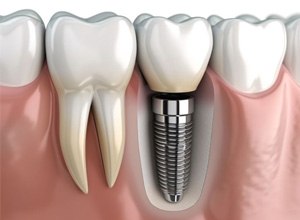
We often work with local specialists for the dental implant placement surgery. This team-based approach ensures that you get expert care during every stage of your tooth replacement journey.
During the surgery, your care provider will first make sure you are comfortable. Then, they will make incisions in your gums and place the implants at their pre-planned positions. Once the incisions are closed, you can go home to start the healing process. Most patients are feeling well enough to go back to work within a day or two of their procedure.
Dental Implant Osseointegration & Abutment Placement
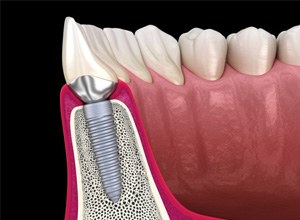
Once the implants are in your jawbone, a remarkable process known as osseointegration should begin. This is the biological means through which implants bond with the surrounding tissue. In other words, it is what allows them to serve as strong prosthetic tooth roots.
Adequate osseointegration usually takes a few months. Thereafter, you might need to undergo a second minor surgery. During this procedure, the tops of your implants will be exposed, and healing caps will be placed on them. Later, the caps will be replaced by abutments, which are small connector pieces that will keep your new teeth in place. (Some patients get abutments during the initial implant surgery, so this second operation is not always necessary.)
Delivery of Dental Implant Restorations

This is perhaps the most exciting part of the dental implant process! Our team will take impressions of your mouth and use those as the basis for designing your new restoration. Your crown, bridge, or denture will be customized to work with your unique oral anatomy and facial structures. Once our partner laboratory finishes making it, we will verify that it meets our expectations before we attach it to your implants. Then, you can go off and start to experience the many benefits of your new smile.
Benefits of Dental Implants
 One
of the most outstanding features of dental implants is that they replace both the roots and the crowns
of missing teeth. This enables them to slow down and perhaps even prevent the bone loss that often occurs in the
jaw after tooth extractions, and it gives the implants the potential to stay with you for many decades. In fact,
if you care for your new smile well, it could last for the rest of your life!
One
of the most outstanding features of dental implants is that they replace both the roots and the crowns
of missing teeth. This enables them to slow down and perhaps even prevent the bone loss that often occurs in the
jaw after tooth extractions, and it gives the implants the potential to stay with you for many decades. In fact,
if you care for your new smile well, it could last for the rest of your life!
One of the most outstanding features of dental implants is that they replace both the roots and the crowns of missing teeth. This enables them to provide a multitude of benefits that are not available with other types of prosthetic teeth. Would you like to learn about some of the specific ways in which dental implants could improve your daily life, your health, and your long-term prospects? Continue reading below. You are also welcome to book a consultation so we can explain how this treatment may affect your unique situation.
Day-to-Day Benefits

Dental implants may have a positive effect on your daily life in a few ways:
- Strength and confidence. Dental implants are extremely sturdy, and they feel natural in the mouth, enabling you to speak and eat with confidence. In fact, you should be able to enjoy virtually all foods, including those that are off-limits with traditional dentures.
- Well-made implant restorations look so beautiful that it is unlikely anyone will be able to tell that they are not your natural teeth.
- Easy maintenance.In quite a few respects, implants function similarly to natural teeth. Caring for them is even similar! Your oral hygiene routine will probably not have to undergo any drastic changes.
Health Benefits

Dental implants may prove advantageous for your oral and overall health in the following ways:
- Jawbone preservation. When the roots of natural teeth go missing, the jawbone starts to deteriorate. However, implants replace tooth roots. This enables them to slow down and perhaps even prevent or reverse bone loss in the jaw.
- No damage to other teeth.In many cases, it is possible to place implants without extracting or modifying any of a patient’s remaining natural teeth.
- Prevent dental drift. Implants can serve as placeholders that prevent other teeth from drifting out of their proper places.
- Improved nutrition. An enhanced ability to chew can allow you to eat a wide variety of nutritious foods, including fruits, veggies, lean proteins, whole grains, and more. In turn, a balanced diet may reduce your risk of numerous diseases.
Long-Term Benefits

Dental implants start delivering benefits soon after they are placed, and they can continue to provide perks for many years:
- Implants form a strong bond with your jawbone, so under good conditions, they have the potential to last an entire lifetime. The restorations (crowns, bridges, and dentures) that go on top of dental implants also have a long life expectancy.
- Excellent value. Although dental implants cost more upfront than other tooth replacement options, they are an excellent value because they last for so long. In contrast, traditional dentures usually need to be replaced every 5 – 7 years; over time, they can be quite costly!
- Long-term health benefits. Did you know that tooth loss is associated with a shortened life expectancy? Dental implants can support your long-term wellness and might even allow you to live longer.
Who Dental Implants Can Help
 Both you and
your dentist have to consider a wide range of factors to determine if implants are right for you. An ideal
candidate for this procedure doesn’t smoke, is free of gum disease and other serious health concerns, and
has a strong, dense jawbone. However, even folks who don’t fit this “ideal” profile might
still be able to receive implants.
Both you and
your dentist have to consider a wide range of factors to determine if implants are right for you. An ideal
candidate for this procedure doesn’t smoke, is free of gum disease and other serious health concerns, and
has a strong, dense jawbone. However, even folks who don’t fit this “ideal” profile might
still be able to receive implants.
Both you and your dentist have to consider a wide range of factors to determine if implants are right for you. The only way to find out for sure if you are a candidate for this potentially life-changing treatment is to visit our Abington team for an in-depth consultation. After performing a thorough examination of your mouth and taking some X-rays, we will design a treatment plan that is tailored to your circumstances, budget, and oral health needs. Most people with one or more missing teeth can get dental implants!
Who Is a Good Candidate for Dental Implants?
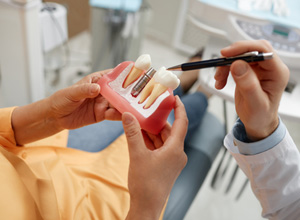
You might be an ideal candidate for dental implants if:
- You are missing one or more teeth.
- Your jawbone is strong enough to support dental implants.
- You are well enough to undergo minor surgery.
- You are free of active gum disease and other oral health conditions that might adversely affect your implants.
- You do not smoke.
Of course, even if you do not meet these “ideal” criteria, implants might still be a good choice for you. With the help of local specialists, we may be able to perform preliminary procedures, such as bone grafting, that can make your mouth into a hospitable environment for your new teeth.
Missing One Tooth
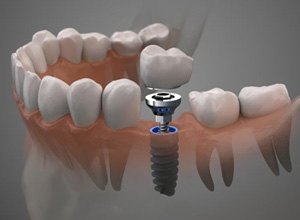
If you are missing only one tooth, you might need just a single implant. After the placement surgery, it should bond with the surrounding bone within a few months. Then, we can design a beautiful custom crown to go on top of it.
A single tooth implant is superior to a traditional bridge in multiple ways. For example, it does not typically require that any of the nearby teeth be modified. It is also incredibly strong and sturdy. Plus, the implants provide valuable stimulation for the jawbone that is not available with tooth replacement options that only rebuild the visible portion of missing teeth.
Missing Multiple Teeth
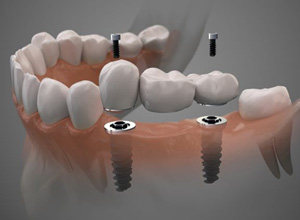
If you have two consecutive missing teeth, you might need just one implant post. It can support a crown and a pontic (artificial tooth) to fill in the empty space. If you have three or more missing teeth, you may benefit from a bridge that has an implant on each end, which can support one or more pontics between them.
What if your missing teeth are not adjacent to one another? You might need multiple single-tooth implants or an implant supported partial denture. Our team can discuss your options during your consultation.
Missing All Teeth
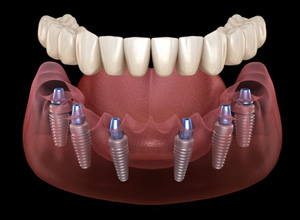
If you are missing all of your teeth throughout one of your dental arches, we will likely recommend that you receive an implant denture. This type of prosthetic replaces a full arch of missing teeth. It can require anywhere from two to 8 or more implants per arch, depending on the details of your treatment plan.
Some implant dentures are removable for easy daily cleaning. Others are permanently fixed in the mouth and can be treated almost exactly like natural teeth. Our team can help you determine which option is the best fit for your circumstances.
How Much Do Dental Implants Cost?
 For an exact
idea of how much your implants may cost, you’ll have to speak to your dentist so they can plan out the
details of your procedure. There are a number of factors that will contribute to the final price of your new
smile:
For an exact
idea of how much your implants may cost, you’ll have to speak to your dentist so they can plan out the
details of your procedure. There are a number of factors that will contribute to the final price of your new
smile:
- The number of implants you need. Logically, it costs less to place a single implant than it does to place four or five.
- Abutment placement. This is often a separate procedure from implant placement and comes with its own cost.
- Your restoration(s). Crowns, bridges, and implant-supported dentures all have different prices. Also, not all restorations are made of the same materials; porcelain and acrylic are both suitable for creating artificial teeth, but porcelain (the stronger of the two) tends to cost more.
Although implants present a significant upfront cost, they offer a remarkable value. If you care for them well, they prove to be a long-lasting investment in your oral health and in your quality of life!
To learn more about dental implants or to schedule a consultation, contact our office. Hopefully, it won’t be long before you’re on your way to being the proud owner of a renewed smile!
Implant Dentures
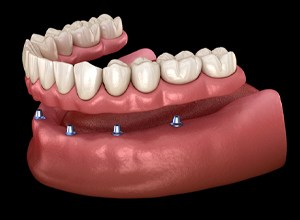
Implants are a versatile treatment that can replace any number of teeth. If you have suffered extensive tooth loss, we will likely recommend implant dentures to rebuild your smile. With just a few strategically placed implants (2 – 6), we can provide the base of support for an entire arch of prosthetic teeth. Both permanently fixed implant dentures and removable overdentures are available. They are much sturdier and longer lasting than traditional dentures.
